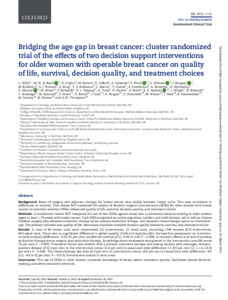WYLD, Lynda, REED, Malcolm WR, COLLINS, Karen, BURTON, Maria, LIFFORD, Kate, EDWARDS, Adrian, WARD, Sue, HOLMES, Geoff, MORGAN, Jenna, BRADBURN, Mike, WALTERS, Stephen J., RING, Alistair, ROBINSON, Thompson, MARTIN, Charlene, CHARTER, Tim, PEMBERTON, Kirsty, SHRESTHA, Anne, NETTLESHIP, Anthony, MURRAY, Chris, BROWN, Mike, RICHARDS, Paul, LEUNG CHEUNG, Kwok, TODD, Annaliza, HARDER, Helena, BRAIN, Kate, AUDISIO, Riccardo A., WRIGHT, Juliette, SIMCOCK, Richard, ARMITAGE, Fiona, BURSNALL, Matt, GREEN, Tracy, REVELL, Deirdre, GATH, Jacqui, HORGAN, Kieran, HOLCOMBE, Chris, WINTER, Matt, NAIK, Jay, PARMESHWAR, Rishi, GOSNEY, Margot, HATTON, Matthew and THOMSON, Alistair
(2021).
'Bridging the Age Gap in Breast Cancer: Cluster randomised trial of the effects of two decision support interventions for older women with operable breast cancer on quality-of-life, survival, decision-quality and treatment choices'.
British Journal of Surgery.
[Article]
Documents
27985:583144
![[thumbnail of Burton-BridgingAgeGapBreast(VoR).pdf]](https://shura.shu.ac.uk/27985/79.hassmallThumbnailVersion/Burton-BridgingAgeGapBreast%28VoR%29.pdf)

Preview
Abstract
Background
Rates of surgery and adjuvant therapy for breast cancer vary widely between breast units. This may contribute to differences in survival. This cluster RCT evaluated the impact of decision support interventions (DESIs) for older women with breast cancer, to ascertain whether DESIs influenced quality of life, survival, decision quality, and treatment choice.
Methods
A multicentre cluster RCT compared the use of two DESIs against usual care in treatment decision-making in older women (aged at least ≥70 years) with breast cancer. Each DESI comprised an online algorithm, booklet, and brief decision aid to inform choices between surgery plus adjuvant endocrine therapy versus primary endocrine therapy, and adjuvant chemotherapy versus no chemotherapy. The primary outcome was quality of life. Secondary outcomes included decision quality measures, survival, and treatment choice.
Results
A total of 46 breast units were randomized (21 intervention, 25 usual care), recruiting 1339 women (670 intervention, 669 usual care). There was no significant difference in global quality of life at 6 months after the baseline assessment on intention-to-treat analysis (difference –0.20, 95 per cent confidence interval (C.I.) –2.69 to 2.29; P = 0.900). In women offered a choice of primary endocrine therapy versus surgery plus endocrine therapy, knowledge about treatments was greater in the intervention arm (94 versus 74 per cent; P = 0.003). Treatment choice was altered, with a primary endocrine therapy rate among women with oestrogen receptor-positive disease of 21.0 per cent in the intervention versus 15.4 per cent in usual-care sites (difference 5.5 (95 per cent C.I. 1.1 to 10.0) per cent; P = 0.029). The chemotherapy rate was 10.3 per cent at intervention versus 14.8 per cent at usual-care sites (difference –4.5 (C.I. –8.0 to 0) per cent; P = 0.013). Survival was similar in both arms.
Conclusion
The use of DESIs in older women increases knowledge of breast cancer treatment options, facilitates shared decision-making, and alters treatment selection.
Trial registration numbers: EudraCT 2015-004220-61 (https://eudract.ema.europa.eu/), ISRCTN46099296 (http://www.controlled-trials.com).
Actions (login required)
 |
View Item |



 Tools
Tools Tools
Tools